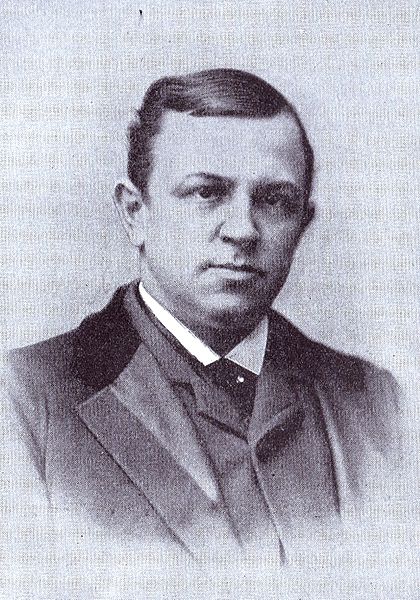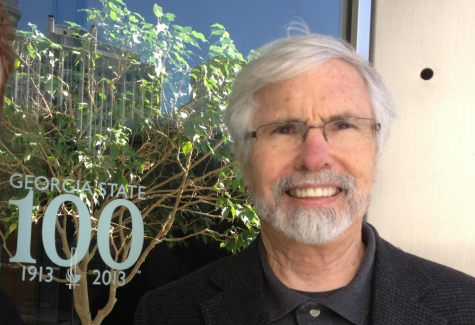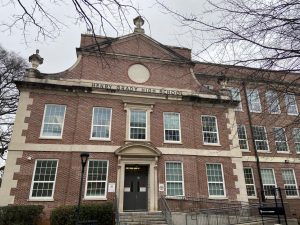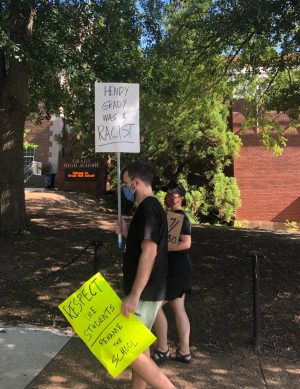Henry W. Grady analyzed: Q&A with historian Dr. Timothy Crimmins

A late nineteenth-century portrait shows Henry W. Grady, the orator whose efforts to create a “New South” spurred economic development in the South.
August 12, 2020
Dr. Timothy Crimmins is a professor of history and Director of the Center for Neighborhood and Metropolitan Studies at Georgia State University. With a background in urban history, Crimmins has written multiple books about Atlanta and has been involved in exhibits at the Atlanta History Center. The Southerner sat down with Crimmins to talk about Henry W. Grady, Grady High’s namesake, his role in shaping Atlanta and the controversy surrounding him.
Who was Henry W. Grady as a public figure?
Henry Grady was the editor of the Atlanta Constitution and that was a position that he used to advance the political interests of his faction of the Democratic Party. His major effort was to advance the interests of Atlanta in state government and to bring economic development to the South, to Georgia and to Atlanta, in particular. He’s known as a great promoter of the city of Atlanta, and upon his death, there were efforts to memorialize [him], and Grady Hospital is the result of that effort. The city at the time did not have a public hospital, and so the push was to use the death of Henry Grady to raise the funds in order to make that happen. He lives on in the aftermath of his death with the public hospital that was created and named in his honor. And then, there was a major statue that was created to honor him that is located on Marietta Street downtown. That was unveiled at a time when the City Hall was located at that location, and so it was the civic plaza that Grady’s statue was at the center of.
Specifically after the Civil War, what role did Grady play in the South?
Grady’s time frame was the 1880s when he came into his prime because he died at the age of 39. This is the period when the Northern involvement in the politics of the South had ended. After 1877, the South was left to its own designs. The occupation of federal troops that enforce voting rights was ended. It was a time when the Democratic party consolidated its control of Georgia politics, and it was within this context that Grady operated. The key to this was the effort on the part of the white Democrats to advance policies of racial separation and white supremacy, and so it was partly partial of what you find in newspaper articles. I like to refer to papers like the Atlanta Constitution at the time as white newspapers because they presented the white point of view, and Grady was one who was advancing that. And then, his additional role was to go to the North and give speeches that said that the war was over, the vision that came as the result of the war should be put aside, it was time now to focus on a common interest of North and South and that was economic development. Grady was a clever speaker and writer as well.
How would you describe his political opinions?
The other part of his message to Northern audiences was that all was well with race relations, that the negro in the South, as he would have said, was a contended lot, they were happy with interacting with the white establishment, and that it was a safe place to invest because of the state of race relations. That the issue of race should be left to the region, it shouldn’t be something that needed to be of any concern to people in the North. That was a message that was received well on the part of the North. The struggle over the Civil War, the conflict in its aftermath during Reconstruction, the investors in the North who were putting their capital in the South did not want to get involved with that and they wanted to hear Grady’s message. It was a message that the white man should rule and the black man should accept his lot, what we call white supremacy.
How public was Grady about his political opinions? How did that impact his journalism?
What Grady said in his speeches and in his newspaper writings were what white leaders in the state said at the time and in the region. So, it wasn’t that Henry Grady was out of the political mainstream. He was giving opinions that were the standard opinions of political leaders at the time. If you take a look at debates that went on during Grady’s period and the period after the debate was not whether the white man should be in charge, it was how much he should be in charge and how few prerogatives African Americans should have. It was not a good time for African Americans throughout this entire period and it continued and actually got worse after the death of Henry Grady.
Going back to Grady’s life, when he was the editor of the Atlanta Constitution, what themes were evident in his journalism?
Like any good newspaper editor, he wanted to be on top of stories and publish the latest. Newspapers at the time, I guess they were more like they are today, you get strong brands of opinion with them, so if you think of Fox News as a brand of television offering a very particular political point of view, this is clearly the case with newspapers in Atlanta in the 1880s, 90s and early 1900s. One newspaper would support one faction of the Democratic Party, and the other newspaper would support the other faction. The other thing that the newspapers did, well Grady’s in particular, it promoted Atlanta. Everything was great in Atlanta, and not too great in other cities and not too great in other places.
A controversial thing in Grady’s journalism were some of the headlines having to do with lynching. This was brought up in some of the name change meetings, but some were saying that Grady humorized the lynchings. What do you think about that?
From today’s perspective, the newspapers were just a mess. There’s no getting around it. They played to a white view and they tried to minimize the violence against black people. They played up stereotypes. You read accounts of black people that are just…it’s hard to read them because of the things they are saying. This wasn’t just the Atlanta Constitution, it was Southern newspapers, and that’s why African Americans established their own newspapers.
Do you think that the negative aspects of Grady’s legacy outweigh the positive or vice-versa?
To me, it’s a difficult thing. If you think of Grady High School, it’s the second name that it’s had. It was Boys High originally. When it was named “Henry Grady” in the aftermath of World War II, it was named Henry Grady not because he was a racist, it was named Henry Grady because he was a name associated with the promotion of Atlanta and with Grady Hospital. They had played down…I mean the sort of the racial element of him wasn’t the reason Grady High School was named after him. If you think of Girls High, it was renamed Roosevelt High School, after the president. I think that the naming of it wasn’t done in a way that was going on at that time in the following decade where you have efforts at using, for example, Stone Mountain Park in 1956 was created as apart of an effort to bring back all that Confederate symbolism to help support and argue for the continuation of racial segregation. Be that as it may, when Grady High School was created, like Boys High School who preceded it, it was a segregated high school with white kids only.
What do you think should be taught about Henry W. Grady?
I mean I think Henry Grady should be taught for what he is. He promoted the interest of Atlanta, brought economic development. His entrepreneurial spirit is something that the Chamber of Commerce loves to amplify. On the other hand, he also advanced white supremacy and that is a horrible element of the past, and so the question is what do you do with it? What do we do with the name of Grady Hospital? What do we do with the Grady statue on Marietta Street? What do we do with Grady High School?










